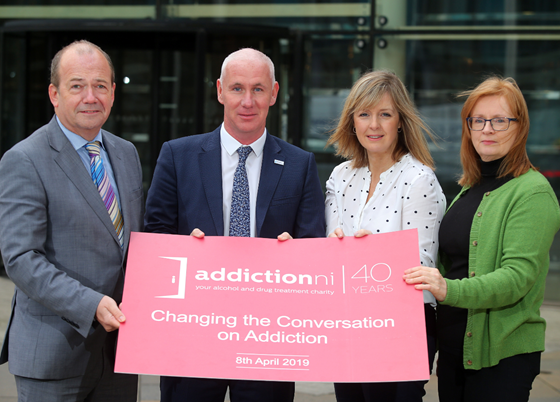On Monday 8th April, Addiction NI hosted a conference celebrating 40 years of being Northern Ireland’s leading addiction charity.
‘Changing The Conversation on Addiction’ aimed to bring lived experience, professional bodies, policy makers, allies and academics together in one room, to challenge the stigma, discuss approaches and learn from one another. The aim being to work together to achieve better outcomes for our services users through changes to policy and practice.
Alex Bunting, Director of Addiction NI opened the conference by reinforcing the need for policy change and for elected representatives to return to Stormont so that these issues could be progressed. Dr Michael McBride, Department of Health’s Chief Medical Officer was in attendance and spoke about our evidence-based approach as well as the impact of substance abuse on our health services, the economy and the criminal justice system. Dr McBride recognised the progress that had been made including reductions in binge drinking, drug use among young people decreasing and adult prevalence of drug misuse plateauing. However he also added that;
“The problem isn’t going away… There can be no wrong doors. Every contact counts and there should be no missed opportunities when someone contacts a service”
The conference was hosted by BBC’s Tara Mills, and included keynote speakers and panel discussions with experts and those with lived experience.
– Addresses from Director of Addiction NI, Alex Bunting and Dr Michael McBride, Chief Medical Officer.
– Panel on ‘Changing policy to achieve better outcomes.’ Panellists included: The Chief Medical Officer for Northern Ireland, Michael McBride, Penny McCanny, (Anyone’s Child Campaign), who lost her son to a drug overdose and Tony Duffin, CEO of the Ana Liffey Drug Project, Tony Duffin and Danny Kushlick, Founder of Transform Drug Policy Foundation.
– Keynote addresses on ‘Drugs do not Define Addiction’ by Dr Stanton Peele, world renowned addiction expert, psychologist and author and Dr Marc Lewis, Developmental Neuroscientist and Author, on “Narrowing Brains in Narrowing Environments’.
– Panel on ‘Changing our approach.’ Panellists will include: A service user, the Acting Director of Rehabilitation: Probation Board NI, Dr Geraldine O’Hare, the Permanent Secretary of the Department of Justice, Peter May and Judge Bagnall;
– Panel on ‘Stigma Free Conversations’. Panellists include: Liz Karter, UK Gambling Addiction Specialist, Clare Flynn, Forward South Partnership, Kelly Bonner, BBC Journalist and Lisa McElherron, Group Director of Inspire Wellbeing.
The conference highlighted key areas to consider including dual diagnoses, mental health and a whole system approach stretching beyond criminal justice. Breaking the stigma around addiction and how the media play a massive part of how the public see addiction.
The conference also celebrated the “Open Door” self-referral approach introduced by Addiction NI almost 40 years ago. Addiction NI have recently introduced peer support services throughout Northern Ireland and have been involved in the successful delivery of Substance Misuse Courts.
In 2017 alone, 136 deaths registered in Northern Ireland were from drug-related causes, 60% more than the number recorded 10 years ago. Recent figures also show that the number of males dying from drug-related causes in Northern Ireland has increased by 98% in the last 10 years.
Alcohol related deaths in Northern Ireland are also on the rise and 2017 saw the number of alcohol related deaths increase for the fourth consecutive year to see the highest number on record to 303.
Between 2013 and 2017 there was a 65% increase in female alcohol-related deaths.
The Director of Addiction NI, Alex Bunting said:
“It is extremely important to highlight the excellent work that goes on helping support people impacted by substance misuse. The standard of care and support that is provided across the statutory and community sectors continues to make a real difference and saves lives every day.
However addiction is an increasingly complex issue. It has a devastating impact on individuals but also affects their families, friends and communities, with areas of high social deprivation suffering disproportionately. Under investment in mental health services over the past 40 years against a backdrop of trauma and conflict has created a situation where the mental health needs of the people of Northern Ireland must to take priority.
The increasing needs in our communities are significant and can no longer be ignored, if we are to change the current culture we need to think about stopping the causes of addiction as well as providing effective treatment and support. That is why our conference aims to start a conversation focused on how we can evolve current drug and alcohol policy, review our approaches and reduce the stigma of addiction.
We at Addiction NI support people and families on a daily basis who are in crisis and we know from our 40 years’ experience that the solution lies in a comprehensive, joined up approach which involves key departments and agencies from right across government, partners from the voluntary and community sector and people, families and communities across Northern Ireland.”
Penny McCanny, who lost her eldest son Aidan to an accidental overdose of heroin in 2013 said:
“People across Northern Ireland are struggling and often do not know where to turn for help.
“We need a coordinated approach, especially at community level, and an addiction strategy would provide an important basis for that to happen. A joined up approach could make all the difference to the lives of people who are struggling with addiction, their loved ones and their community.”
From Monday 8th April we will be introducing our new Addiction NI logo. Our updated strapline Reducing Harm, Promoting Recovery is a modern expression of how we approach our work and allows us to realise our ambition of providing a range of services for a range of addiction issues.
The new logo aligns Addiction NI firmly within the Inspire group whilst retaining the important community legacy of Addiction NI.
